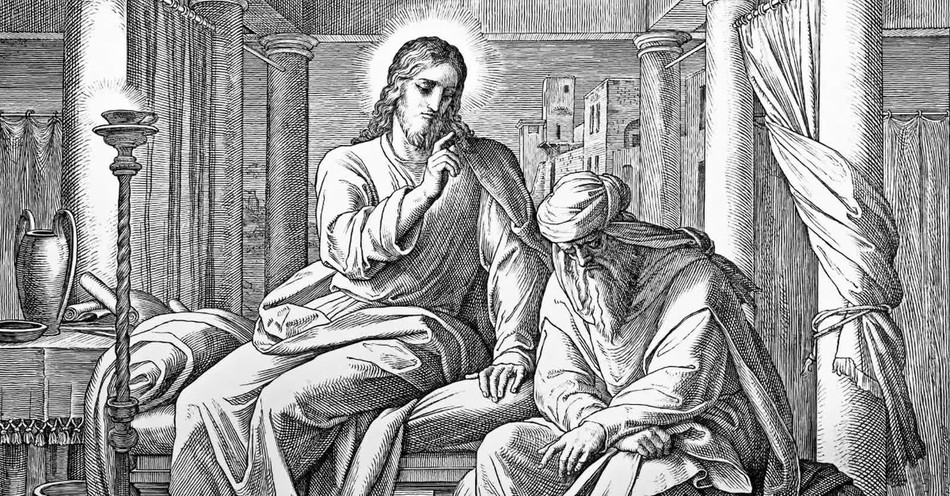Nicodemus, which means "conqueror of the people," was a Pharisee, a ruler of the Jews, and a teacher of Israel (John 3:1, John 3:10). His secret visit to our Lord led to a significant discourse recorded only by St. John. Nicodemus showed noble candor and a simple love of truth despite his hesitation and fear of man. Ultimately, he became a follower of Christ and, together with Joseph of Arimathaea, took down and embalmed the body of Jesus.
Nicodemus is a prominent figure in the New Testament of the Bible, specifically in the Gospel of John. He is important because his interaction with Jesus provides significant theological insights and is central to the Christian understanding of faith, rebirth, and salvation.
We know from John 3 that Nicodemus was a Pharisee, a member of the Jewish ruling council, who came to Jesus at night with a question. He received an answer that generations of Christians would hide in their hearts.
Nicodemus in the Bible
Nicodemus is a notable figure in the New Testament, particularly in the Gospel of John. He is introduced as a Pharisee and a member of the Jewish ruling council, the Sanhedrin. Nicodemus is described as a man of considerable influence and knowledge, respected among his peers for his understanding of Jewish law and tradition.
One of the most significant encounters involving Nicodemus occurs in John 3:1-21, where he visits Jesus at night. This nighttime meeting is often interpreted as a sign of his cautious approach to Jesus, wanting to avoid the scrutiny of his peers. During this conversation, Jesus speaks to Nicodemus about the necessity of being "born again" to see the Kingdom of God, leading to one of the most famous verses in the Bible, John 3:16. Nicodemus appears puzzled by Jesus' teachings about spiritual rebirth, demonstrating a contrast between earthly understanding and spiritual insight.
Nicodemus reappears in John 7:50-51, where he defends Jesus' right to a fair hearing before the Sanhedrin, subtly challenging his colleagues who were condemning Jesus without proper procedure. This action reflects Nicodemus's sense of justice and willingness to question the prevailing opinions of the ruling council.
The final mention of Nicodemus is in John 19:39-42, following the crucifixion of Jesus. He assists Joseph of Arimathea in the burial of Jesus, bringing a mixture of myrrh and aloes, which indicates his respect and reverence for Jesus. This act of caring for Jesus' body highlights Nicodemus's courage and devotion, as he publicly aligns himself with Jesus at a time when it was dangerous to do so.
Jesus Teaches Nicodemus: You Must Be Born Again
Now there was a man of the Pharisees named Nicodemus, a ruler of the Jews. This man came to Jesus by night and said to him, "Rabbi, we know that you are a teacher come from God, for no one can do these signs that you do unless God is with him." Jesus answered him, "Truly, truly, I say to you, unless one is born again he cannot see the kingdom of God." Nicodemus said to him, "How can a man be born when he is old? Can he enter a second time into his mother's womb and be born?" Jesus answered, "Truly, truly, I say to you, unless one is born of water and the Spirit, he cannot enter the kingdom of God. That which is born of the flesh is flesh, and that which is born of the Spirit is spirit. Do not marvel that I said to you, 'You must be born again.'
The wind blows where it wishes, and you hear its sound, but you do not know where it comes from or where it goes. So it is with everyone who is born of the Spirit." Nicodemus said to him, "How can these things be?" Jesus answered him, "Are you the teacher of Israel and yet you do not understand these things? Truly, truly, I say to you, we speak of what we know, and bear witness to what we have seen, but you do not receive our testimony. If I have told you earthly things and you do not believe, how can you believe if I tell you heavenly things?
No one has ascended into heaven except he who descended from heaven, the Son of Man. And as Moses lifted up the serpent in the wilderness, so must the Son of Man be lifted up, that whoever believes in him may have eternal life. (John 3:1-15)
Nicodemus is mentioned two more times in the Gospel of John. In John 7:50-52, he questions the Sanhedrin's decision to arrest Jesus, suggesting that Jesus should be given a fair hearing. Later, in John 19:38-42, Nicodemus, along with Joseph of Arimathea, is involved in the burial of Jesus, signifying a public identification with Jesus and His movement.
Significance of Nicodemus in the Bible
The importance of Nicodemus's story lies in several key aspects:
Teaching on Spiritual Rebirth: The conversation between Nicodemus and Jesus is a foundational teaching on the concept of being "born again" or "born of the Spirit." It highlights the spiritual transformation that is central to Christian faith and salvation.
Diverging Responses to Jesus: Nicodemus represents a Pharisee who, despite his initial caution, was open to considering the claims of Jesus. This highlights people's diverse responses to Jesus during his ministry, from curiosity to opposition.
Public Witness: Nicodemus's later involvement in the burial of Jesus demonstrates a shift in his relationship with Jesus from a secret inquirer to a more public association, which could be seen as an act of faith and commitment.
Nicodemus’ Secret Conversation with Jesus
In John 3, Nicodemus concedes that God must have sent Jesus because of all the miraculous signs he performed. Jesus gets to the heart of the matter by responding with firm truth: “…no one can see the kingdom of God unless they are born again” (John 3:3).
Thinking literally and physically, Nicodemus asks how anyone can be born twice (John 3:4). Jesus continues the conversation, teaching Nicodemus about the need to be born of the Spirit (John 3:5-8).
Then Nicodemus simply asks, “How can this be?” (John 3:9). Jesus laments that Nicodemus cannot seem to grasp such a heavenly concept (John 3:12) and relies on an Old Testament story (Numbers 4-9), which a Pharisee was sure to have heard before, to illustrate how to be born again and get to heaven.
“Just as Moses lifted up the snake in the wilderness, so the Son of Man must be lifted up, that everyone who believes may have eternal life in him” (John 3:14-15).
It’s in this story of Nicodemus that John writes the God-inspired verse:
“For God so loved the world that he gave his one and only Son, that whoever believes in him shall not perish but have eternal life. For God did not send his Son into the world to condemn the world, but to save the world through him.” (John 3:16-17)
Nicodemus was Not a Spy
Some scholars question Nicodemus’ motives. They claimed that he came as a representative of the Sanhedrin as a kind of spy tasked with trapping Jesus in giving an official response based on the questions he would pose. After all, Nicodemus speaks using the first-person plural ("We know You have come from God as a Teacher"). But there are three problems with this idea.
Since other Jewish officials publicly challenged Jesus, Nicodemus would not have needed to sneak through the night to visit Jesus.
He did not ask; he declared that Jesus was a Teacher from God. This hardly seems the language of a disapproving enquirer.
Mainly, Nicodemus later reveals himself as a believer when he comes with Joseph of Arimathea to prepare Jesus's body for a proper Jewish burial (John 19:39).
The better answer is that Nicodemus, while not yet fully convinced of Jesus’ divinity, had seen the miracles Jesus performed. Comparing what he knew from the Old Testament and the expectation of the Messiah, he planned for a way to see Jesus. Therefore, he came honestly seeking after God. By Jesus's crucifixion, Nicodemus had grown bold enough to reveal what he now believed publicly.
“And though now he came by night, afterward he owned Christ publicly,” according to Matthew Henry’s Concise Commentary.
Nicodemus' Veneration in Christian Traditions
Eastern Orthodox and Catholic Traditions: Nicodemus is venerated as a saint in both the Eastern Orthodox and Catholic Churches. His feast day is celebrated on August 3rd in the Orthodox Church and August 31st in the Catholic Church. His story is often recounted to emphasize themes of faith, courage, and transformation.
Liturgical References: In various Christian liturgies, Nicodemus is remembered for his role in the burial of Jesus, which is particularly noted during Holy Week and the observance of Good Friday.
Influence on Christian Theology and Art
Theological Reflections: Nicodemus's interactions with Jesus have been the subject of extensive theological reflection. His story is frequently cited in discussions on conversion, the nature of faith, and the process of coming to a deeper understanding of Christian doctrines.
Art and Literature: Nicodemus has been a popular subject in Christian art and literature. Depictions of his night visit to Jesus and his role in the burial of Jesus have inspired numerous paintings, sculptures, and literary works, contributing to the rich tapestry of Christian iconography and storytelling.
What Else Does the Bible Say About Nicodemus?
In John 7:50-51, Nicodemus spoke to a group of unbelieving Pharisees against unlawfully seizing Jesus.
Later, in John 19:39, after Jesus had been crucified, Nicodemus joined Joseph of Arimathea in giving Jesus a traditional Jewish burial. Nicodemus “brought a mixture of myrrh and aloes, about seventy-five pounds” (John 19:39).
Adapted from The Life and Times of Jesus the Messiah by Alfred Edersheim (Book III, Chapter VI) and from the lecture notes of Dr. Doug Bookman, professor of New Testament Exposition at Shepherds Theological Seminary (used by permission).
Photo Credit: © Getty/gldburger
This article is part of our People of Christianity catalog that features the stories, meaning, and significance of well-known people from the Bible and history. Here are some of the most popular articles for knowing important figures in Christianity:
How Did the Apostle Paul Die?
Who are the Nicolaitans in Revelation?
Who Was Deborah in the Bible?
Who Was Moses in the Bible?
King Solomon's Story in the Bible
Who Was Lot's Wife in the Bible?
Who Was Jezebel in the Bible?
Who Was the Prodigal Son?



